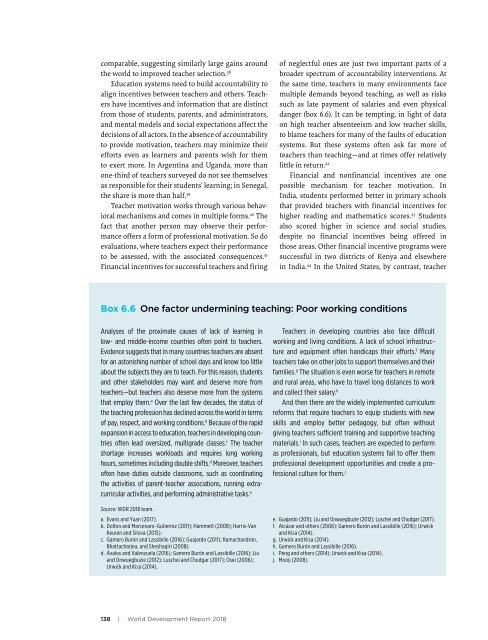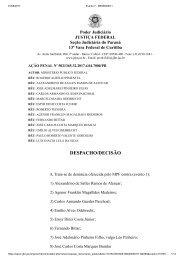Brasil só deve dominar Leitura em 260 anos, aponta estudo do Banco Mundial Relatorio Banco Mundial _Learning
You also want an ePaper? Increase the reach of your titles
YUMPU automatically turns print PDFs into web optimized ePapers that Google loves.
comparable, suggesting similarly large gains around<br />
the world to improved teacher selection. 38<br />
Education syst<strong>em</strong>s need to build accountability to<br />
align incentives between teachers and others. Teachers<br />
have incentives and information that are distinct<br />
from those of students, parents, and administrators,<br />
and mental models and social expectations affect the<br />
decisions of all actors. In the absence of accountability<br />
to provide motivation, teachers may minimize their<br />
efforts even as learners and parents wish for th<strong>em</strong><br />
to exert more. In Argentina and Uganda, more than<br />
one-third of teachers surveyed <strong>do</strong> not see th<strong>em</strong>selves<br />
as responsible for their students’ learning; in Senegal,<br />
the share is more than half. 39<br />
Teacher motivation works through various behavioral<br />
mechanisms and comes in multiple forms. 40 The<br />
fact that another person may observe their performance<br />
offers a form of professional motivation. So <strong>do</strong><br />
evaluations, where teachers expect their performance<br />
to be assessed, with the associated consequences. 41<br />
Financial incentives for successful teachers and firing<br />
of neglectful ones are just two important parts of a<br />
broader spectrum of accountability interventions. At<br />
the same time, teachers in many environments face<br />
multiple d<strong>em</strong>ands beyond teaching, as well as risks<br />
such as late payment of salaries and even physical<br />
danger (box 6.6). It can be t<strong>em</strong>pting, in light of data<br />
on high teacher absenteeism and low teacher skills,<br />
to blame teachers for many of the faults of education<br />
syst<strong>em</strong>s. But these syst<strong>em</strong>s often ask far more of<br />
teachers than teaching—and at times offer relatively<br />
little in return. 42<br />
Financial and nonfinancial incentives are one<br />
possible mechanism for teacher motivation. In<br />
India, students performed better in primary schools<br />
that provided teachers with financial incentives for<br />
higher reading and math<strong>em</strong>atics scores. 43 Students<br />
also scored higher in science and social studies,<br />
despite no financial incentives being offered in<br />
those areas. Other financial incentive programs were<br />
successful in two districts of Kenya and elsewhere<br />
in India. 44 In the United States, by contrast, teacher<br />
Box 6.6 One factor undermining teaching: Poor working conditions<br />
Analyses of the proximate causes of lack of learning in<br />
low- and middle-income countries often point to teachers.<br />
Evidence suggests that in many countries teachers are absent<br />
for an astonishing number of school days and know too little<br />
about the subjects they are to teach. For this reason, students<br />
and other stakeholders may want and deserve more from<br />
teachers—but teachers also deserve more from the syst<strong>em</strong>s<br />
that <strong>em</strong>ploy th<strong>em</strong>. a Over the last few decades, the status of<br />
the teaching profession has declined across the world in terms<br />
of pay, respect, and working conditions. b Because of the rapid<br />
expansion in access to education, teachers in <strong>deve</strong>loping countries<br />
often lead oversized, multigrade classes. c The teacher<br />
shortage increases workloads and requires long working<br />
hours, sometimes including <strong>do</strong>uble shifts. d Moreover, teachers<br />
often have duties outside classrooms, such as coordinating<br />
the activities of parent-teacher associations, running extracurricular<br />
activities, and performing administrative tasks. e<br />
Source: WDR 2018 team.<br />
a. Evans and Yuan (2017).<br />
b. Dolton and Marcenaro-Gutierrez (2011); Hammett (2008); Harris-Van<br />
Keuren and Silova (2015).<br />
c. Gamero Burón and Lassibille (2016); Guajar<strong>do</strong> (2011); Ramachandran,<br />
Bhattacharjea, and Sheshagiri (2008).<br />
d. Ávalos and Valenzuela (2016); Gamero Burón and Lassibille (2016); Liu<br />
and Onwuegbuzie (2012); Luschei and Chudgar (2017); Osei (2006);<br />
Urwick and Kisa (2014).<br />
Teachers in <strong>deve</strong>loping countries also face difficult<br />
working and living conditions. A lack of school infrastructure<br />
and equipment often handicaps their efforts. f Many<br />
teachers take on other jobs to support th<strong>em</strong>selves and their<br />
families. g The situation is even worse for teachers in r<strong>em</strong>ote<br />
and rural areas, who have to travel long distances to work<br />
and collect their salary. h<br />
And then there are the widely impl<strong>em</strong>ented curriculum<br />
reforms that require teachers to equip students with new<br />
skills and <strong>em</strong>ploy better pedagogy, but often without<br />
giving teachers sufficient training and supportive teaching<br />
materials. i In such cases, teachers are expected to perform<br />
as professionals, but education syst<strong>em</strong>s fail to offer th<strong>em</strong><br />
professional <strong>deve</strong>lopment opportunities and create a professional<br />
culture for th<strong>em</strong>. j<br />
e. Guajar<strong>do</strong> (2011); Liu and Onwuegbuzie (2012); Luschei and Chudgar (2017).<br />
f. Alcázar and others (2006); Gamero Burón and Lassibille (2016); Urwick<br />
and Kisa (2014).<br />
g. Urwick and Kisa (2014).<br />
h. Gamero Burón and Lassibille (2016).<br />
i. Peng and others (2014); Urwick and Kisa (2014).<br />
j. Mooij (2008).<br />
138 | World Development Report 2018








